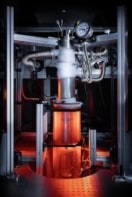The centennial Nobel Prize for Physics has been awarded to the researchers who created the first Bose-Einstein condensates - the so-called fifth state of matter - in the laboratory. Eric Cornell of JILA and National Institute of Standards and Technology in Boulder, Colorado, Wolfgang Ketterle of the Massachusetts Institute of Technology, and Carl Wieman of JILA and the University of Colorado, share the 2001 prize for "the achievement of Bose-Einstein condensation in dilute gases of alkali atoms, and for early fundamental studies of the properties of the condensates".

Bose-Einstein condensation was first predicted in 1924 by the Indian physicist, Satyendra Nath Bose, and Albert Einstein. In a Bose condensate the de Broglie wavelength of the atoms is comparable with the average interatomic spacing, which causes all the atoms to condense into the same quantum ground state. All the atoms are described by the same quantum wavefunction, which gives the condensate many unusual properties.
Cornell, Wieman and colleagues in Boulder produced the first condensate in an ultracold gas of rubidium atoms in 1995. Later that year Ketterle and co-workers at MIT achieved condensation in a gas of sodium atoms. Since then there has been an explosion of interest in Bose condensation as physicists have probed the properties of this unique state of matter. Bose condensates have been used to produce atom lasers – laser-like beams in which photons are replaced by atoms – and study fundamental processes such as superfluidity.
The winners will share the cash prize of 10 million Swedish kroner – around £730 000 – and will receive their gold medals and diplomas at an Award Ceremony in Stockholm on 10 December. The Swedish capital celebrates the centenary with an exhibition, a programme of lectures and a students’ essay contest.



